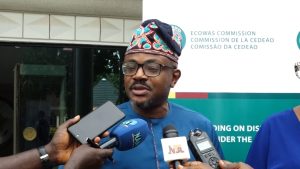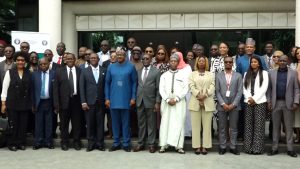The ECOWAS Commission has held capacity building training on Dispute Settlement Mechanisms under the AfCFTA and ECOWAS Instruments.
The Director of trade, at the Trade Department of the ECOWAS Commission in Abuja, Kolawole Sofola said the objective of the workshop is to enhance the capacity of the court of justice to play a role in arbitration on trade agreements.
“Nigeria and the ECOWAS countries are not only members of free trade area which is operationalised through the ECOWAS trade liberalisation scheme but they are also signatories to the African continental free trade area,” he said.
“And with any free trade agreement, there are bound to be instances where there are disagreements, so there has to be mechanism on how to resolve them,” Sofola added.

He said, “this workshop is specifically designed to enhance your capacity to support the effective resolution of complex trade disputes that may arise as the AfCFTA and various ECOWAS protocols are implemented’’.
‘’Although the AfCFTA’s Dispute Settlement Body holds the primary responsibility for addressing trade disputes under the agreement, the ECOWAS Court has a crucial complementary role to play. It helps to ensure that the legal framework within the region remains strong and in alignment with the broader objectives of the AfCFTA’’.
He added that: “the African Continental Free Trade Area (AfCFTA), is a landmark agreement, encompassing 54 African Union member states and establishing one of the largest free trade areas in the world’’.
He stated that “AfCFTA represents not just an opportunity, but a transformation for Africa, providing a platform for trade liberalisation, economic growth, and development. However, it will only succeed if the rules of trade are adhered to, and any disputes that arise are settled in a fair, efficient, and transparent manner.’’
Speaking at the workshop, Prof. Muhammed Ladan, Director General of the Nigeria Institute of Advance Legal studies said AfCFTA aims to bring together, the economic communities in the region.

He said: “The Africa Continental Free Trade Area agreement with its 8 protocols on Trade in goods, trade in services, dispute settlement mechanism, investment, intellectual property rite, competition, digital trade as well as women and youth, seeks to bring all the 8 regional economic communities in Africa, to serve as a building block of the continental free trade area agreement”.
Justice Sengu Mohamed Koroma, judge of ECOWAS Court said “the ECOWAS community court of justice is a critical institution for resolving disputes among its member states. Sub-article 5 of article 9 of the court protocol of 1991 as amended by the 2005 supplementary protocol empowers the court to act as an arbitrator for the community.”
He added that “the AFCFTA dispute resolution mechanism has the potential to enhance the integrity and efficiency of the trading system it has established”.
At the sideline of the event, Uzo Amaka Obidike, senior legal Adviser, representing the director, Legal, ECOWAS Commission said “the mechanism for dispute resolution under the AfCFTA is arbitration. So it is important to build the capacity of the judicial officers at the ECOWAS court to be able to handle arbitration disputes.
“It is important to bring them up to speed with the progress that has been made in the AfCFTA and to also prepare them to give interpretation of protocols that are part of the agreement and to give legal opinions”.
“The adoption of AfCFTA marks a pivotal milestone in the journey towards intra African trade and the expansion of economic opportunities across our continent. For ECOWAS member states, this agreement is a significant complement to the existing ECOWAS framework on trade and free movement which has long fostered the free flow of goods, services and people within the sub region.”


Comments are closed.